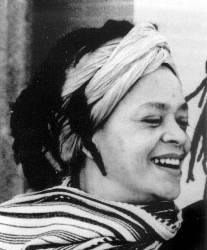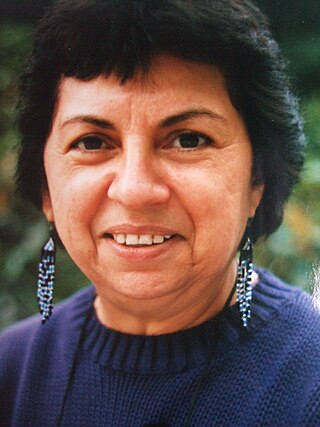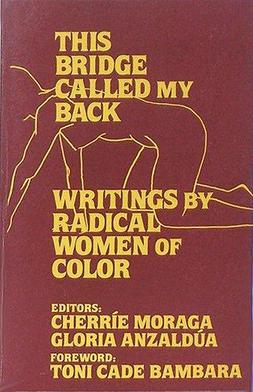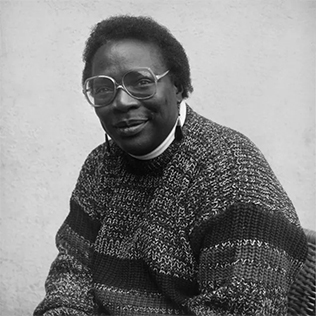Related Research Articles

Erotica is art, literature or photography that deals substantively with subject matter that is erotic, sexually stimulating or sexually arousing. Some critics regard pornography as a type of erotica, but many consider it to be different. Erotic art may use any artistic form to depict erotic content, including painting, sculpture, drama, film or music. Erotic literature and erotic photography have become genres in their own right. Erotica also exists in a number of subgenres including gay, lesbian, women's, monster, tentacle erotica and bondage erotica.

Audre Lorde was an American writer, professor, philosopher, intersectional feminist, poet and civil rights activist. She was a self-described "Black, lesbian, feminist, socialist, mother, warrior, poet" who dedicated her life and talents to confronting different forms of injustice, as she believed there could be "no hierarchy of oppressions" among "those who share the goals of liberation and a workable future for our children."

Carol J. Adams is an American writer, feminist, and animal rights advocate. She is the author of several books, including The Sexual Politics of Meat: A Feminist-Vegetarian Critical Theory (1990) and The Pornography of Meat (2004), focusing in particular on what she argues are the links between the oppression of women and that of non-human animals. She was inducted into the Animal Rights Hall of Fame in 2011.

Toni Cade Bambara, born Miltona Mirkin Cade, was an African-American author, documentary film-maker, social activist and college professor.

A facial is a sexual activity in which a man ejaculates semen onto the face of one or more sexual partners. A facial is a form of non-penetrative sex, though it is generally performed after some other means of sexual stimulation, such as vaginal sex, anal sex, oral sex, manual sex or masturbation. Facials are regularly portrayed in pornographic films and videos, often as a way to close a scene.

Lesbian feminism is a cultural movement and critical perspective that encourages women to focus their efforts, attentions, relationships, and activities towards their fellow women rather than men, and often advocates lesbianism as the logical result of feminism. Lesbian feminism was most influential in the 1970s and early 1980s, primarily in North America and Western Europe, but began in the late 1960s and arose out of dissatisfaction with the New Left, the Campaign for Homosexual Equality, sexism within the gay liberation movement, and homophobia within popular women's movements at the time. Many of the supporters of Lesbianism were actually women involved in gay liberation who were tired of the sexism and centering of gay men within the community and lesbian women in the mainstream women's movement who were tired of the homophobia involved in it.

Gloria Evangelina Anzaldúa was an American scholar of Chicana feminism, cultural theory, and queer theory. She loosely based her best-known book, Borderlands/La Frontera: The New Mestiza (1987), on her life growing up on the Mexico–Texas border and incorporated her lifelong experiences of social and cultural marginalization into her work. She also developed theories about the marginal, in-between, and mixed cultures that develop along borders, including on the concepts of Nepantla, Coyoxaulqui imperative, new tribalism, and spiritual activism. Her other notable publications include This Bridge Called My Back: Writings by Radical Women of Color (1981), co-edited with Cherríe Moraga.
Diana E. H. Russell was a feminist writer and activist. Born and raised in Cape Town, South Africa, she moved to England in 1957, and then to the United States in 1961. For the past 45 years she was engaged in research on sexual violence against women and girls. She wrote numerous books and articles on rape, including marital rape, femicide, incest, misogynist murders of women, and pornography. For The Secret Trauma, she was co-recipient of the 1986 C. Wright Mills Award. She was also the recipient of the 2001 Humanist Heroine Award from the American Humanist Association. She was also an organizer of the First International Tribunal on Crimes against Women, in Brussels in March 1976.

Chicana feminism is a sociopolitical movement, theory, and praxis that scrutinizes the historical, cultural, spiritual, educational, and economic intersections impacting Chicanas and the Chicana/o community in the United States. Chicana feminism empowers women to challenge institutionalized social norms and regards anyone a feminist who fights for the end of women's oppression in the community.

Paula Gunn Allen was an American poet, literary critic, activist, professor, and novelist. Of mixed-race European-American, Arab-American, and Native American descent, she identified with her mother's people, the Laguna Pueblo. Gunn Allen wrote numerous essays, stories and poetry with Native American and feminist themes, and two biographies of Native American women. She edited four collections of Native American traditional stories and contemporary writing.

Elana Dykewomon was an American lesbian activist, author, editor, and teacher. She was a recipient of the Lambda Literary Award for Lesbian Fiction.

This Bridge Called My Back: Writings by Radical Women of Color is a feminist anthology edited by Cherríe Moraga and Gloria E. Anzaldúa first published in 1981 by Persephone Press. The book centers on the experiences of women of color and emphasizes the points of what is now called intersectionality within their multiple identities, challenging white feminists who made claims to solidarity based on sisterhood. Writings in the anthology, along with works by other prominent feminists of color, call for a greater prominence within feminism for race-related subjectivities, and ultimately laid the foundation for third wave feminism. It is among the most cited books in feminist theory.

Pat Parker was an African American poet and activist. Both her poetry and her activism drew from her experiences as a Black lesbian feminist. Her poetry spoke about her tough childhood growing up in poverty, dealing with sexual assault, and the murder of a sister. At eighteen, Parker was in an abusive relationship and had a miscarriage after being pushed down a flight of stairs. After two divorces, she came out as a lesbian, "embracing her sexuality" and said she was liberated and "knew no limits when it came to expressing the innermost parts of herself".

Andrea Rita Dworkin was an American radical feminist writer and activist best known for her analysis of pornography. Her feminist writings, beginning in 1974, span 30 years. They are found in a dozen solo works: nine books of non-fiction, two novels, and a collection of short stories. Another three volumes were co-written or co-edited with US constitutional law professor and feminist activist Catharine A. MacKinnon.
Feminist views on pornography range from total condemnation of the medium as an inherent form of violence against women to an embracing of some forms as a medium of feminist expression. This debate reflects larger concerns surrounding feminist views on sexuality, and is closely related to those on prostitution, BDSM, and other issues. Pornography has been one of the most divisive issues in feminism, particularly in Anglophone (English-speaking) countries. This division was exemplified in the feminist sex wars of the 1980s, which pitted anti-pornography activists against pro-pornography ones.
Feminism has affected culture in many ways, and has famously been theorized in relation to culture by Angela McRobbie, Laura Mulvey and others. Timothy Laurie and Jessica Kean have argued that "one of [feminism's] most important innovations has been to seriously examine the ways women receive popular culture, given that so much pop culture is made by and for men." This is reflected in a variety of forms, including literature, music, film and other screen cultures.
Feminist views on sexuality widely vary. Many feminists, particularly radical feminists, are highly critical of what they see as sexual objectification and sexual exploitation in the media and society. Radical feminists are often opposed to the sex industry, including opposition to prostitution and pornography. Other feminists define themselves as sex-positive feminists and believe that a wide variety of expressions of female sexuality can be empowering to women when they are freely chosen. Some feminists support efforts to reform the sex industry to become less sexist, such as the feminist pornography movement.
Queer of color critique is an intersectional framework, grounded in Black feminism, that challenges the single-issue approach to queer theory by analyzing how power dynamics associated race, class, gender expression, sexuality, ability, culture and nationality influence the lived experiences of individuals and groups that hold one or more of these identities. Incorporating the scholarship and writings of Audre Lorde, Gloria Anzaldúa, Kimberlé Crenshaw, Barbara Smith, Cathy Cohen, Brittney Cooper and Charlene A. Carruthers, the queer of color critique asks: what is queer about queer theory if we are analyzing sexuality as if it is removed from other identities? The queer of color critique expands queer politics and challenges queer activists to move out of a "single oppression framework" and incorporate the work and perspectives of differently marginalized identities into their politics, practices and organizations. The Combahee River Collective Statement clearly articulates the intersecting forces of power: "The most general statement of our politics at the present time would be that we are actively committed to struggling against racial, sexual, heterosexual, and class oppression, and see as our particular task the development of integrated analysis and practice based upon the fact that major systems of oppression are interlocking. The synthesis of these oppressions creates the conditions of our lives." Queer of color critique demands that an intersectional lens be applied queer politics and illustrates the limitations and contradictions of queer theory without it. Exercised by activists, organizers, intellectuals, care workers and community members alike, the queer of color critique imagines and builds a world in which all people can thrive as their most authentic selves- without sacrificing any part of their identity.
"Becoming Visible: The First Black Lesbian Conference" was held at The Women's Building in San Francisco, California, from October 17 to 19, 1980. It has been credited as the first conference for African-American lesbian women.
Aishah Shahidah Simmons is an American documentary filmmaker, author, educator, and activist based in Philadelphia, Pennsylvania.
References
- 1 2 Moraga, Cherríe; Anzaldúa, Gloria, eds. (2015). This Bridge Called My Back, Fourth Edition: Writings by Radical Women of Color. State University of New York Press. pp. 232–238, 268. ISBN 978-1438454382. OCLC 894128432.
- 1 2 3 4 Crawford, Anna Elaine Brown (January 1, 2002). Hope in the Holler: A Womanist Theology. Westminster John Knox Press. pp. 79, 85. ISBN 9780664222543.
- ↑ "About". Black Magnolias. April 11, 2015. Archived from the original on November 7, 2017. Retrieved November 1, 2017.
- ↑ Quashie, Kevin Everod (2004). Black Women, Identity, and Cultural Theory: (un)becoming the Subject . Rutgers University Press. pp. 17–18. ISBN 9780813533674.
andrea r canaan black women identity.
- ↑ Bell, Linda A. (2012). Beyond the Margins: Reflections of a Feminist Philosopher. SUNY Press. p. 102. ISBN 9780791486016.
- ↑ Berger, Michele Tracy; Guidroz, Kathleen (January 1, 2010). The Intersectional Approach: Transforming the Academy through Race, Class, and Gender. Univ of North Carolina Press. p. 83. ISBN 9780807895566.
- ↑ Faulkner, Mara (1993). Protest and Possibility in the Writing of Tillie Olsen . University of Virginia Press. pp. 106. ISBN 9780813914176.
Andrea Canaan.